Categories
”FbF READY” Reducing heat waves’ impacts on the vulnerable populations of Hanoi through VNRC capacity building in forecast-based financing for anticipatory humanitarian actions
Since 2017 the Viet Nam Red Cross and the German Red Cross have been partnered to develop an EAP for urban heatwaves. This process has included an extensive survey of target populations in twelve districts of Hanoi and close collaboration with Vietnam Institute of Meteorology, Hydrology, and Climate Change (IMHEN) on developing a new heat index forecast.
This project seeks to reduce the health and economic impacts of heatwaves on vulnerable urban populations in Hanoi and Da Nang.
Key facts
Start/end date
January 2018 - March 2021
Hazards covered
Heatwave
Regions covered
Hanoi City: 15 wards from 8 urban districts
Da Nang
Hai Phong
Early action sectors
Health
Anticipatory Action Protocols/Plans in place
Heatwave
Activations
None to date
Population to be reached during activation
More than 25,500 people
Key actors/implementing partners
The Viet Nam Red Cross and German Red Cross, with support from the Red Cross Red Crescent Climate Centre, have worked closely with Vietnam Institute of Meteorology, Hydrology, and Climate Change (IMHEN) to develop the protocol and the forecasts products necessary to trigger action.
Anticipation in practice: Project description
In Viet Nam, floods and landslides, typhoons, earthquakes, and droughts have serious impacts. However, in addition to these more visible hazards, the urban population—and the elderly, street vendors, and those working outside or living in informal settlements in particular—are vulnerable to the health effects of heatwaves and extreme heat. These “silent emergencies” have increased in frequency and duration in the last 30 years, a trend which is likely to continue in the face of climate change and increased urbanization. Urban centers trap heat and create sweltering conditions that can have dire consequences for vulnerable populations, including exacerbating respiratory illnesses and other underlying conditions, dehydration, heat exhaustion, heat stroke, and ultimately death. During heatwaves, many people are forced to choose between exposing themselves to the heat and their outdoor, income-generating activities. The Viet Nam Red Cross seeks to provide relief to vulnerable populations in Hanoi, Da Nang and Hai Phong by implementing the following early actions for a total of 5 days, one before the heatwave, and 4 days during the event:
- Opening community cooling centers (in existing facilities or mobile tents as well as in traveling buses) to offer a cool place for people to escape the heat, hydrate, and receive first aid and heat-related health information.
- Awareness campaigning about potential adjustments in behavior, and prevention through slums visits, megaphone messaging, Facebook campaigning, etc.
These actions are triggered when a 6-day heat index forecast developed specifically for this project indicates that the heat index will exceed the 99th percentile in Danang (~47,13°C) or the 97th percentile in Hanoi and Hai Phong (~48,16°C) for 2 consecutive days . A stop mechanism can halt activities if the forecast changes 3 days before the event was forecast. The trigger was made possible because the project worked closely with the Viet Nam Institute of Meteorology, Hydrology and Climate Change (IMHEN) to develop a new heat index forecast product for all three cities. While the product is currently only available to the Red Cross, it may eventually be published more widely. This collaboration demonstrates how partnerships around anticipatory action can lead to capacity building and beneficial innovation.
VNRC coordinates closely with key government institutions in this processs, such as the Vietnam Disaster Management Agency (VNDMA), the Disaster Management Working Group (DMWG) as well as with the Disaster Management Policy and Technology Centre (DMPTC) to avoid creating parallel systems.
Project impressions
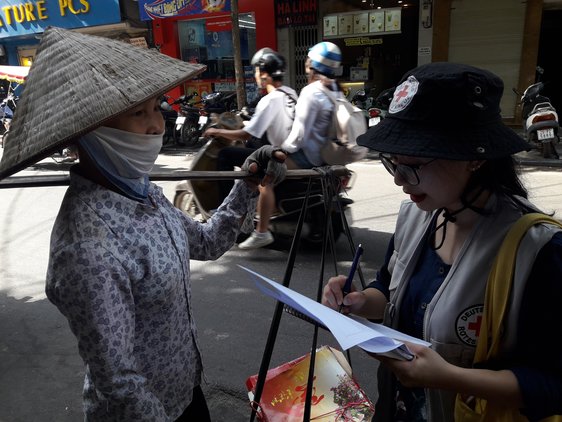
Street Vendor responding to KAP survey in Hanoi 2018 © German Red Cross
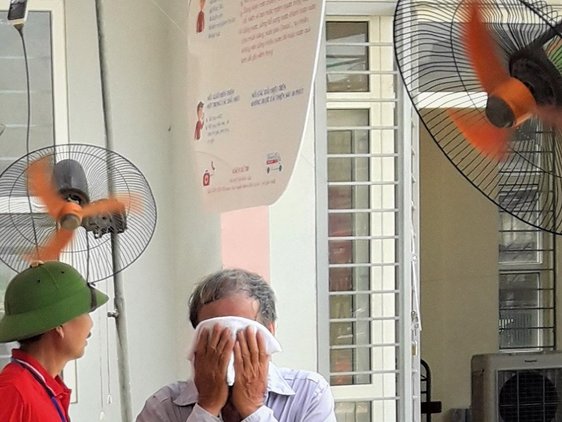
Beneficiary cooling off with a towel © German Red Cross
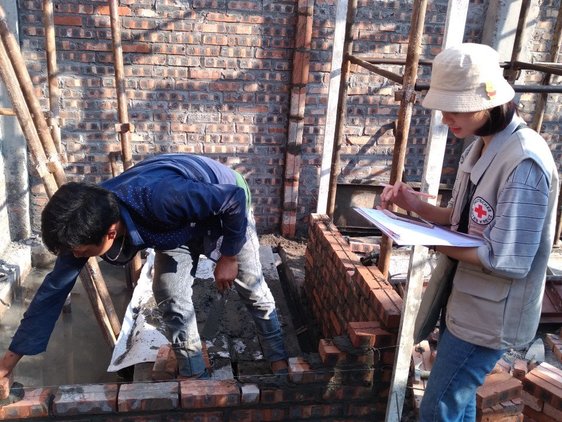
Builder taking the KAP survey in Hanoi 2018 © German Red Cross
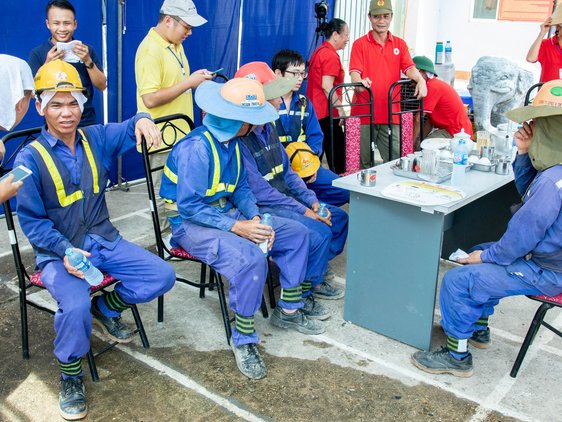
Construction Workers in a Hanoi Cooling Tent 2019 © German Red Cross
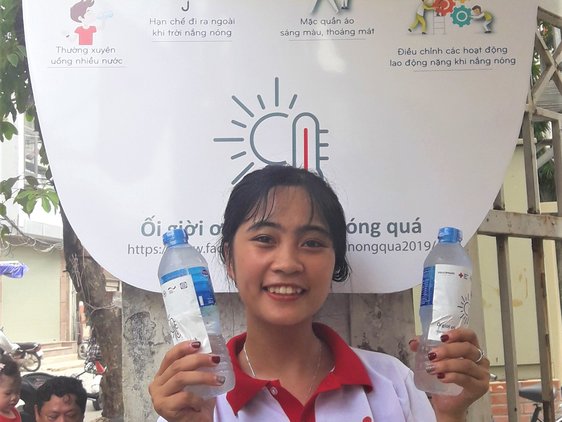
VNRC Volunteer in front of a cooling tent Hanoi 2019 07 © German Red Cross
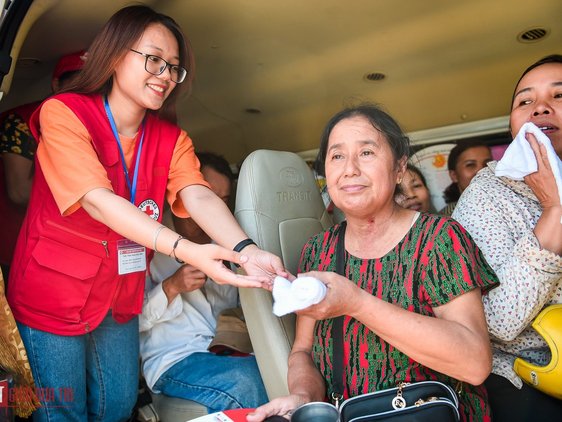
Volunteer providing a towel on a cooling bus in Hanoi © German Red Cross

Street Vendor responding to KAP survey in Hanoi 2018 © German Red Cross
Beneficiary cooling off with a towel © German Red Cross
Builder taking the KAP survey in Hanoi 2018 © German Red Cross
Construction Workers in a Hanoi Cooling Tent 2019 © German Red Cross
VNRC Volunteer in front of a cooling tent Hanoi 2019 07 © German Red Cross
Volunteer providing a towel on a cooling bus in Hanoi © German Red Cross
Lessons Learnt
In order to ensure that the early actions would meet beneficiary needs, VNRC conducted a Knowledge, Attitudes, and Practices (KAP) survey of over 1,000 street vendors, for-hire motorcycle drivers, construction workers, and people living in informal settlements in 12 districts of Hanoi. The survey provided valuable information for the early actions and their theories of change.
I feel exhausted during heatwaves and it is extremely difficult for me to cope with heat effect by myself. At night I can only pour water to cool down my bed.
It is too hot in the street and I spent less time outside {during hot days} and try to find shade. What a miserable life!
Further Information
German Red Cross: Forecast based Financing - Vietnam
First year of implemention
Play Video
